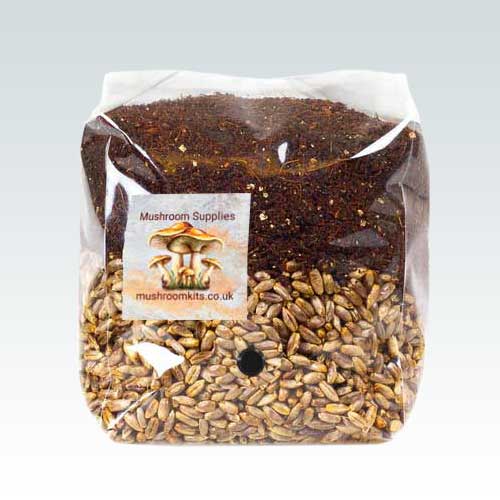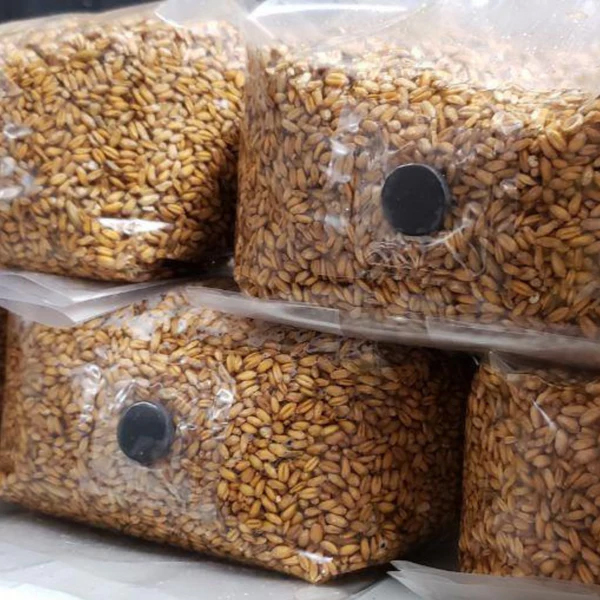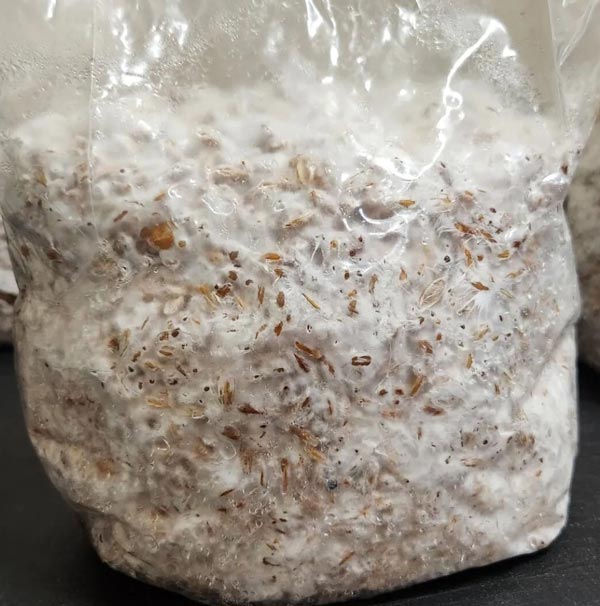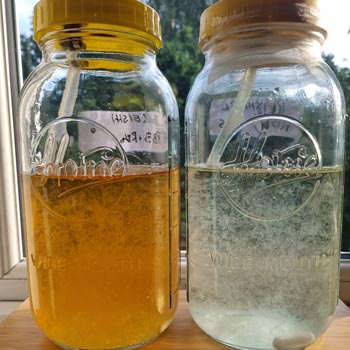Product Guides – Using our Products
 This page and the product guides listed here are really only useful to people who have bought or are thinking of buying selected products from mushroomkits.co.uk but might serve as a general guide for anyone looking into different ways of growing mushrooms at home.
This page and the product guides listed here are really only useful to people who have bought or are thinking of buying selected products from mushroomkits.co.uk but might serve as a general guide for anyone looking into different ways of growing mushrooms at home.
Patience is the key to success when growing mushrooms. You need patience to read enough to understand what you need to do before you even get started. You need patience to plan out and then follow strict sterile working practices. You need patience to wait while your grow colonises at different stages and then more patience while you wait for mushrooms to start fruiting. You also need patience to deal with unforeseen disasters such as contamination creeping in, and working out what triggered it. Without patience, many mushroom growers would have pulled all their hair out ages ago!
Top Advice
If you haven’t already purchased growing supplies and most definitely if you already have, put aside an evening to read up on sterile working practices. Our product guides contain a few tips in this area but reading as much on the subject as possible should help you to work out how best to defend your mushrooms against an army of potential contaminants. Then do a little shopping for necessary supplies, such as 70% isopropyl alcohol (cheap on amazon) and disposable nitrile gloves. Seriously, every minute you spend reading up on this will save you an hour of irritation later.
Product Guides
All in One Grow Bags

One of our most popular products for newcomers to mushroom growing is the so-called “All in One” CVG mushroom grow bag. These ‘all in one’ grow bags contain sterilised grain, where your mycelium will start to grow, and CVG substrate that you will mix your colonised grain with later in the process.
These bags are only suitable for growing what are commonly known as ‘manure loving mushrooms’, otherwise known as coprophilous mushrooms. We don’t know what you’re planning on growing but you will so before buying, jump onto google search to see which mushrooms are included in this category.
As explained in our product guides, ‘all in one’ bags contain grain and substrate, all in one bag, and do not include inoculate material such as liquid culture, which you need to provide yourself.
Click here to read our product guide on how to use our ‘all in one’ grow bags.
 Sterilised Rye Grain
Sterilised Rye Grain
We supply sterilised grain for growers who intend to make their own mushroom grain spawn. This is a product typically used by more experienced growers, who will then pair their colonised grain spawn with the substrate of their choice. Although more commonly used by experienced growers who want to grow mushrooms in larger quantities, the process is not too difficult and can be mastered by well-prepared newcomers too.
Our sterilised rye grain is heat-sealed in top-quality Unicorn mushroom bags fitted with air-exchange filters and simple adhesive injection ports for ease of use.
Click here to read our product guide on how to use sterilised rye grain bags.
Colonised Grain Spawn

For those who wish to grow their own gourmet mushrooms at home to spice up their cuisine, the time it takes to grow mushrooms from start to finish can be too much, so we also provide pre-colonised grain spawn for selected mushroom species such as Oyster and Lion’s Mane mushrooms.
Buying our colonised grain spawn means you skip several weeks of waiting while the grain is being colonised with mycelium. Using our pre-colonised grain spawn is a great way to grow your own edible mushrooms without resorting to overpriced grow boxes commonly available elsewhere. Depending on your chosen substrate, it can also be more economical. Our colonised grain spawn is mostly rye, but often with millet added to help speed things up, or occasionally with slices of agar in the grain which is sometimes used for inoculation.
Our grain spawn needs only to be mixed with your chosen substrate in a suitable container and then it’s just a case of waiting until the whole mixture is colonised.
Click here to read our product guide on how to use colonised grain spawn.
Liquid Culture Syringes
 If you want to produce your own mushroom grain spawn, using Liquid Culture is definitely the best way to go. Using liquid culture is much safer and quicker to use than spore syringes, and more practical for most growers than using agar or grain to grain inoculation.
If you want to produce your own mushroom grain spawn, using Liquid Culture is definitely the best way to go. Using liquid culture is much safer and quicker to use than spore syringes, and more practical for most growers than using agar or grain to grain inoculation.
We try to maintain constant stocks of liquid culture syringes for most of the popular mushroom species but can also make up custom orders on request. If what you want isn’t listed, contact us to discuss your needs.
Liquid culture can be used in several ways; to inoculate grain spawn or ‘all in one’ bags, to inoculate agar (to test it but also to grow fresh mycelium on agar) and even to inoculate fresh liquid culture (to clone the culture).
Click here to read our product guide on how to use liquid culture.
